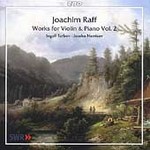
Works for violin and piano: Volume 2 (Incls Sonata No.2 in A Op.78)
 $36.00
Out of Stock
$36.00
Out of Stock6+ weeks add to cart
JOACHIM RAFF
Works for violin and piano: Volume 2 (Incls Sonata No.2 in A Op.78)
Ingolf Turban (violin) Jascha Nemtsov (piano)
[ CPO / CD ]
Release Date: Friday 30 November 2007
This item is currently out of stock. It may take 6 or more weeks to obtain from when you place your order as this is a specialist product.
Joachim Raff was born in Lachen, near Zurich, in 1822. His father had taken refuge in Switzerland, leaving Württemberg to avoid conscription into the French army. Raff's early education was at Wiesenstetten, in Württemberg, followed by a period of teacher training at the Jesuit Gymnasium in Schwyz, where he won prizes in Latin, German, and Mathematics.
Thereafter he took employment as a schoolmaster, while working hard at his private studies in music. Mendelssohn, whom he had approached, recommended him to the attention of the Leipzig publishers Breitkopf and Härtel, who issued sets of his piano pieces in 1844, the year in which the young composer resolved to try his luck in Zurich.
Raff's contact with Liszt began in 1845, when he walked to Basle to hear the latter play. He then accompanied Liszt on his concert tour, and followed this, through the agency of Liszt, with work in Cologne, in part as a critic and less significantly in a music shop. He then moved to Stuttgart, where he met Hans von Bülow, who remained a close friend in the years that followed, and Mendelssohn, accepting the latter's offer to teach him in Leipzig. Von Bülow, meanwhile, took Raff's Concertstück for piano and orchestra into his repertoire, something that was of material assistance in furthering his reputation. The death of Mendelssohn in 1847 allowed Liszt a further exercise of patronage, in securing him work in Hamburg as arranger for a music publisher. In 1850 Raff moved to Weimar, where Liszt was now installed as Music Director Extraordinary and occupied with the provision of music for the orchestra, and above all with the remarkable series of symphonic poems in which he sought to combine the arts of literature and music. At the Villa Altenburg, where he lodged, to be joined shortly by Hans von Bülow, Raff served the master as secretary, copyist and factotum, and must, initially at least, have had a considerable hand in the orchestration of Liszt's work. Whether he was as important as he made out to his correspondents is open to question. "I have cleaned up Liszt's first Concerto symphonique for him", he claimed in an early letter from Weimar, "and now I must score and copy Ce qu'on entend sur la montagne". He declared that the orchestration of Prometheus was his, for the most part, and that he had performed the same service for the symphonic poem Tasso. The violinist Joachim was later to repeat these claims on Raff's behalf. Clearly Liszt needed assistance, and this Raff could provide. Tasso, for example, had been written in 1849 for the centenary of the birth of Goethe and had been scored by August Conradi. Liszt was dissatisfied, and handed the music to Raff, who in 1851 produced a new version, to which Liszt made various subsequent alterations. Raff's own opera König Alfred was staged in Weimar in the same year, without marked success, although it was given three performances, but the validity of his assertions at the time and later on the composition of Liszt's orchestral works must remain doubtful. In 1856, tired of a subordinate position in Weimar as one of the group of acolytes that attended on Liszt and unhappy in his relationship with Liszt's blue-stocking mistress, the Princess Carolyne Sayn-Wittgenstein, Raff left for Wiesbaden, where König Alfred was performed and where he was able to devote himself to composition, teaching and marriage to Doris Genast, member of a well known Weimar theatre family. The period in Wiesbaden was a productive one. It was followed, in 1877, by appointment as director of the Hoch Conservatorium in Frankfurt, where he succeeded in engaging Clara Schumann as a piano teacher, when the institution opened in 1878, the only woman so employed. Further women were to be appointed two years later, and there was a class for women composers, the first of its kind in Germany. Raff remained in Frankfurt until his death in 1882.
Tracks:
Sonata for Violin and Piano no 2 in A major, Op. 78
Morceaux (6) for Violin and Piano, Op. 85
os (3) for Violin and Piano from Wagner's Operas, Op. 63: no 3
